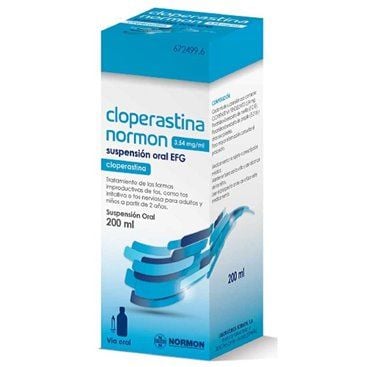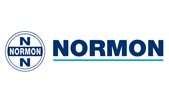Cloperastine Normon 3,54Mg/Ml Efg 200Ml
Cloperastine, the active ingredient in this medicine, is a cough suppressant that inhibits the cough reflex. Cloperastine Normon is a medicine indicated for the treatment of unproductive forms of cough, such as irritating cough or nervous cough for adults and children from 2 years of age.
Cloperastine, the active ingredient in this medicine, is a cough suppressant that inhibits the cough reflex. Cloperastine Normon is a medicine indicated for the treatment of unproductive forms of cough, such as irritating cough or nervous cough for adults and children from 2 years of age.
Cloperastine Normon Efg (3.54 Mg / Ml Oral Suspension 1 Bottle 200 Ml)
ACTION AND MECHANISM
- Antitussive. Cloperastine is a cough suppressant structurally related to ethanolamine antihistamines. Its mechanism of action in cough is unknown, although a possible depression of the cough center has been suggested, accompanied by a bronchodilator and local anesthetic effect on bronchi.
It does not lead to significant nervous dependence or depression, compared to opioid cough suppressants. It has a slight antihistamine activity.
PHARMACOKINETICS
- Absorption: good and rapid oral absorption, with tmax 1-1.5 h. The effects appear after 20-30 min and last for 3-4 h.
Effect of food : they do not affect the absorption of cloperastine.
- Distribution: no data available.
- Metabolism: extensive liver metabolism.
Enzyme inducing / inhibiting capacity : it does not seem to present important effects.
- Elimination: in urine, in the form of metabolites. Elimination is complete in 24 hours.
Pharmacokinetics in special situations :
There are no specific pharmacokinetic data in children, the elderly or patients with renal or hepatic impairment:
INDICATIONS
- Symptomatic treatment of [DRY COUGH] and unproductive, such as irritative or nervous, in adults and children.
POSOLOGY
"CLOPERASTIN EFG"
Doses are expressed in mg of cloperastine phendizoate. 3.45 mg of cloperastine phendizoate is equivalent to 2 mg of cloperastine hydrochloride.
- Adults: 10 ml (approx. 35 mg), 3 times a day.
- Children and adolescents <18 years:
* Adolescents> 12 years: 10 ml (approx. 35 mg), 3 times a day.
* Children 6-12 years: 5 ml (approx. 17.5 mg), 3 times a day.
* Children 2-6 years: 2.5 ml (approx. 8.75 mg), 3 times a day.
- Elderly: no specific dosage recommendations have been made.
Duration of treatment: prolong the treatment as long as the cough persists, and up to a maximum of 7 days, unless otherwise recommended by the physician.
Missed dose: administer the next dose at the usual time. Do not double the next dose.
DOSAGE IN KIDNEY INSUFFICIENCY
No specific dosage recommendations have been made.
DOSAGE IN LIVER INSUFFICIENCY
No specific dosage recommendations have been made.
RULES FOR CORRECT ADMINISTRATION
- Syrup, oral suspension: shake before use.
Administration with food : can be taken with or without food.
CONTRAINDICATIONS
- Hypersensitivity to cloperastine, other antihistamines or any other component of the drug.
- Patients being treated with MAOIs.
Children <2 years, pregnancy and lactation.
PRECAUTIONS
- Anticholinergic effects. Cloperastine has anticholinergic effects, so it could aggravate pathologies such as [CONSTIPATION], [INTESTINAL OBSTRUCTION] (including [INTESTINAL ATONIA], [PEPTIC ULCER] stenosing), [ARTERIAL HYPERTENSION], [HEART FAILURE], [ISCHEMIC CARDIOPATIA CARDIAC ARRHYTHMIA], pathologies that give rise to [URINARY RETENTION] such as [PROSTATIC HYPERPLASIA], [GRAVE MYASTENIA], [GLAUCOMA] or [HYPERTHYROIDISM], among others.
In addition, there may be a reduction in salivation, with the risk of dental [DENTAL CARIES].
Persistent cough Extreme caution is recommended in patients with chronic cough, such as that associated with [SMOKING], [PULMONARY EMPHYSEMA] or [ASTHMA], or in case of [PRODUCTIVE COUGH], because by inhibiting the cough reflex, it could alter expectoration and increase airway resistance. In addition, due to the anticholinergic effects, the volume of bronchial secretion could be decreased, increasing its viscosity and worsening these conditions.
See a doctor if the cough persists for more than a week, or if it is accompanied by a high fever, skin rash, or persistent headache.
- Skin tests for hypersensitivity to allergenic extracts. Due to their antihistamine effects they could give false negatives in diagnostic tests using these extracts. It is recommended to suspend the administration at least 72 hours before performing the test.
ADVICE TO THE PATIENT
- Avoid drinking alcohol during treatment.
- Warn your doctor and / or pharmacist if symptoms continue or worsen after 7 days of treatment, as well as if they are accompanied by fever, severe headache or skin rash.
- Inform your doctor and / or pharmacist if you have conditions such as prostate hyperplasia, high blood pressure or other cardiovascular diseases or glaucoma.
- If you are going to undergo allergy diagnostic tests, stop cloperastine at least 3 days before the test.
- Warn your doctor and / or pharmacist if you experience symptoms such as:
* Dry mouth, constipation, drowsiness, insomnia or the appearance of nightmares, as well as sudden loss of vision or eye pain.
INTERACTIONS
- Alcohol and sedatives (other H1 antihistamines, benzodiazepines, antipsychotics, opiates). Risk of potentiation of sedation.
- Anticholinergic drugs. The anticholinergic effects could be enhanced by combining with other drugs such as certain antihistamines, antiparkinsons, antipsychotics or antidepressants.
- Expectorants and mucolytics. Inhibition of the cough reflex could lead to pulmonary obstruction in the event of increased volume or fluidity of bronchial secretions.
PREGNANCY
Animal safety : cloperastine was not teratogenic in animals.
Safety in humans : There are no adequate and well-controlled studies in humans. Manufacturers contraindicate its use during pregnancy.
Effects on Fertility : No specific studies have been performed in humans.
LACTATION
Animal safety : no data available.
Safety in humans : it is not known if it is excreted with milk, and the consequences it could have for the infant. Manufacturers contraindicate its use during lactation.
KIDS
Cloperastine can be used in children from 2 years of age, adjusting the dose depending on the age of the child. However, it should be kept in mind that children may be more sensitive to anticholinergic effects.
Its use is contraindicated in <2 years.
SENIORS
No specific problems have been described in the elderly that require a dosage adjustment. However, the elderly may be more sensitive to the anticholinergic effects of cloperastine, and may also present pathologies in which the drug could lead to aggravation, such as glaucoma or prostatic hyperplasia.
EFFECTS ON DRIVING
Cloperastine does not appear to have significant effects on the ability to drive, although on rare occasions it may lead to drowsiness or dizziness.
ADVERSE REACTIONS
Adverse reactions are described according to each frequency range, being considered very common (> 10%), common (1-10%), uncommon (0.1-1%), rare (0.01-0.1%) , very rare (<0.01%) or of unknown frequency (cannot be estimated from the available data).
- Digestive: infrequent [DRY MOUTH].
- Neurological / psychological: infrequent [Drowsiness], [DISTONIA], [SHAKING], [DIZZINESS].
- Respiratory: frequency unknown [EPISTAXIS].
- Dermatological: very rare [URTICARIA].
- Allergic: very rare [ANAPHYLAXY].
ADVERSE REACTIONS RELATING TO EXCIPIENTS
- Because it contains propyl parahydroxybenzoate, it can cause [HYPERSENSITIVITY REACTIONS] (possibly delayed).
- Because it contains methyl parahydroxybenzoate, it can cause [HYPERSENSITIVITY REACTIONS] (possibly delayed).
OVERDOSE
Symptoms : Cloperastine poisoning may lead to initial excitability, followed by CNS depression. Likewise, a potentiation of anticholinergic symptoms could appear, although it is not a powerful anticholinergic.
Measures to be taken :
- Antidote: severe anticholinergic symptoms, if they appear, could be treated with physostigmine. However, severe poisoning does not seem likely.
- General elimination measures: perform gastric lavage and administer activated charcoal if the poisoning is recent, the patient is conscious and the airway can be protected.
- Monitoring: monitor electrolyte levels and blood pH.
- Treatment: symptomatic.



